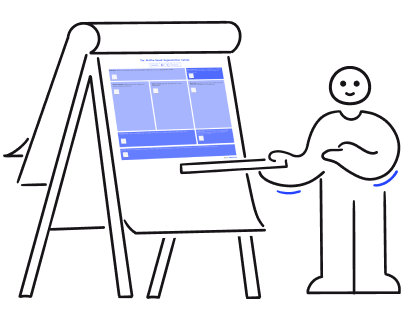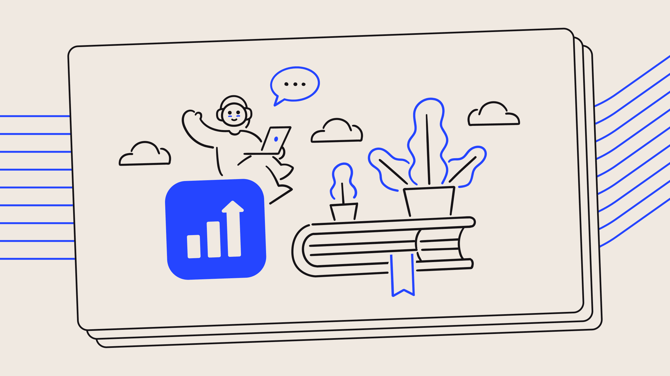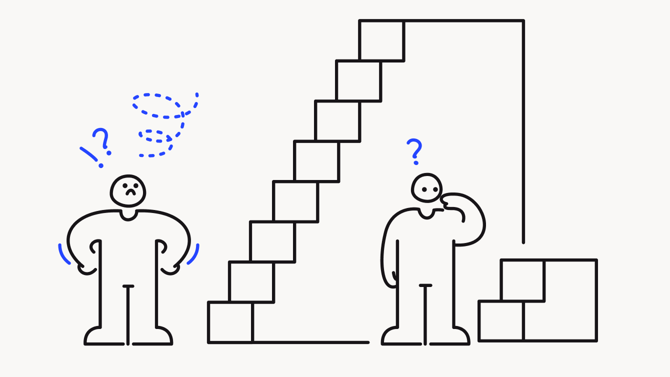Good candidates or employees don’t only need technical skills.
Of course, they are essential in order to follow industry standards, improve themselves and become more efficient. But being ‘good at doing a job’ is not enough!
Think about it… You could have the best programmer in the world, but:
- He’s unable to organize his tasks and wastes time getting his head together;
- He can’t communicate with his project manager, which makes it difficult to follow up on projects;
- He doesn’t document or share his knowledge with the rest of the team;
- He refuses to collaborate with other departments.
Would you really hire someone like that?
No!
You wouldn’t, because your team must have an optimal mix of technical skills (hard skills) and soft skills. So, when you interview potential candidates, you always look for a balance between the two.
That is the key to building a more complete team that is able to meet all challenges that come their way, in addition to improving your employees’ performance.
Does this sound interesting? You’re at the right place, we’re about to demystify it all!
Empower your organization with the skills-based canvas.

What's in this article
What is the difference between hard skills and soft skills?
When it comes to work skills, both types of skills are essential to achieving success: hard skills vs soft skills.
What are the fundamental differences between the two types of skills?
Hard skills are job and task-specific abilities or knowledge that a person has acquired through training or experience. They can be quantified and measured and are directly related to an employee’s role. They are often referred to as ‘know-how, because they are related to task execution.
On the other hand, soft skills are the interpersonal and behavioral skills that allow a person to interact with others in an efficient manner. They are more difficult to quantify and more complex to develop in your employees, but they have a positive impact on the entire team. They are often referred to as ‘knowing how to be’, or the ability to collaborate and coexist.
Hard skills vs soft skills examples
| Hard skills (technical skills) | Soft skills |
|---|---|
| Carpentry | Leadership |
| Graphic design | Creativity |
| Bookkeeping | Patience |
| Translation | Organization |
| Baking | Communication |
As you see, hard skills relate to real tasks that a person has to perform. On the other hand, soft skills relate to the way a person interacts with others.
Hard skills: a considerable technical asset
Hard skills refer to all the technical or academic, specialized skills that are acquired through training or professional experience.
Unlike soft skills, hard skills can be learned relatively easily. For example, anyone (or almost) can learn to use a specific software.
Here are some concrete hard skills examples in business:
- A developer who uses his programming know-how to create new software;
- A secretary who uses her typing speed to perform work requested by her employer;
- An accountant who uses her accounting skills for her company’s bookkeeping;
- A marketing strategist who uses his SEO skills to attract new customers to a website.
While both types of skills are important, technical skills tend to weigh more at the beginning of one’s career. This is because they are usually necessary for job execution.
Hard skills are essential and generally have a high added value in the labor market. They represent limited know-how because they do not take into account the way people interact with each other.
Soft skills: a small nuance that makes a big difference
Soft skills, behavioral skills...
Whatever the name, these skills are human-centric. They include aspects like communication, collaboration and problem-solving.
They are not only useful in specific positions, they rather apply to all positions and even to other aspects of life.
And that is why they are so crucial!
In order to be successful in their career, employees need to have not only technical skills, but also, and above all, the ability to interact with others, adapt and solve problems…
In short, one needs all these small things that we often forget when talking about professional skills.
However, even if they are essential, soft skills should not be mistaken for social skills. The latter is more related to how we interact with others in a personal or social context.
Here are some concrete soft skills examples in business:
- A sales representative who uses his capability to communicate to convince a client to sign a contract;
- A manager who uses her interpersonal skills to motivate her team and improve collaboration within the group;
- A developer who uses his flexibility to adapt to a new programming language;
- An assistant who uses her sense of organization to effectively manage her schedule and that of her boss.
Why is it important to develop the two types of skills in your employees?
We all agree that it is important to develop these two types of skills in your employees, in order to increase productivity. After all, technical skills are not very useful if one does not have the interpersonal skills to apply them.
For example, a person can be very gifted with technical work. However, if they are not able to communicate well with the other team members, they will not be very efficient.
Similarly, a person with good interpersonal skills can not be very comfortable with tools and software. They are useful but do not help to be more creative or work better with others.
This is where behavioral skills come in.
They are essential for good communication, collaboration and innovation. In other words, they help your employees work better together and be more creative in their problem-solving.
It is therefore important to develop these two types of skills in your employees.
How can you do it?
In order to develop your employees’ behavioral skills, you could:
- Encourage them to take risks;
- Motivate them to learn from their mistakes;
- Help them develop a common vision;
- Stimulate creativity and innovation
In order to improve your employees’ technical skills, you could:
- Provide them with a stimulating work environment;
- Encourage them to learn new things;
- Motivate them to be curious;
- Help them develop professionally
How to develop hard skills vs soft skills within your company?
Employee training is one way to provide them with the tools they need to accomplish their daily tasks.
This includes anything related to learning, such as awareness of company rules and procedures or courses on how to use specific tools. That is exactly what you need to develop hard skills!
On the other hand, soft skill development aims to improve your employees’ performance by providing them with the tools and opportunities they need.
It can be done through training, but also through mentoring or professional development programs.
It is important to understand that skills development is a continuous learning process. It never ends.
In other words, investing in your employees is a long-term investment.
As a manager, it is important to give your team members the opportunity to combine training and development.
So, are you ready to get started?
Workleap LMS offers many features to help you develop your employees’ skills.
Our team can even help set up a custom action plan for your business! Contact us for a free demo.
Discover, manage, and grow your team’s skills to unleash their potential and retain your rising stars.




